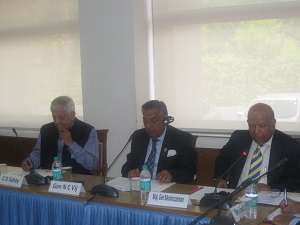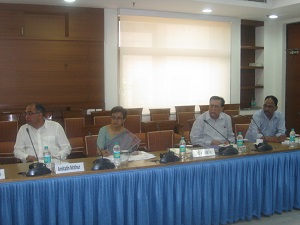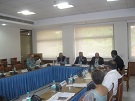Even as Bangladesh continues to face the worst political turmoil in its history, a Round Table Discussion was held at the Vivekananda International Foundation (VIF) on April 7th, 2015 to discuss the current political situation in Bangladesh. The interaction, a bilateral exercise between the VIF and the Bangladesh Institute for Peace and Security Studies (BIPSS), encapsulated the broad spectrum of political and security challenges confronting Bangladesh today and their implications for the bilateral relations between India and Bangladesh. The interaction apparently aimed at exploring the reasons behind the prevailing conflict in Bangladesh and finding out practical and workable solutions to end the persisting deadlock between the two major political parties in Bangladesh namely the Awami League and the Bangladesh Nationalist Party.
 The BIPSS delegation consisted of two members – Maj Gen ANM Muniruzzaman, President BIPSS, and Shafqat Munir, Associate Research Fellow, while the VIF contingent, a wide array of policy experts from different backgrounds, comprised, among others, Lt Gen Ravi Sawhney, Maj Gen PK Chakravorty, Amb Veena Sikri, Amb TCA Rangachari, and Mr, Amitabh Mathur. With General NC Vij, Director VIF, in the chair, the discussions were moderated by CD Sahay, former Secretary RAW.
The BIPSS delegation consisted of two members – Maj Gen ANM Muniruzzaman, President BIPSS, and Shafqat Munir, Associate Research Fellow, while the VIF contingent, a wide array of policy experts from different backgrounds, comprised, among others, Lt Gen Ravi Sawhney, Maj Gen PK Chakravorty, Amb Veena Sikri, Amb TCA Rangachari, and Mr, Amitabh Mathur. With General NC Vij, Director VIF, in the chair, the discussions were moderated by CD Sahay, former Secretary RAW.
In his opening remarks, General NC Vij, Director VIF, underlined India’s close proximity to Bangladesh both in terms of geography and historical and cultural linkages. He however, rued that despite physical closeness and India’s remarkable contribution towards the liberation of Bangladesh, the political relations between the two countries have often remained subjected to the whims and fancies of the ruling political dispensations in Bangladesh. While he stressed the need for Bangladesh to correct this anomaly in the bilateral relationship, he also urged that a stronger partnership would mutually benefit both Bangladesh and India. Maj Gen Muniruzzaman, on his part, said that persistent political unrest in Bangladesh could have deep and far reaching implications for India’s security, especially because the radical groups in Bangladesh are most likely to exploit the situation to their advantage.  He averred that the recent Burdwan blast in India is a manifestation of this growing menace. In so far as the current political crisis in Bangladesh is concerned, the BIPSS President said it is the result of a faulty election held in January 2014. The VIF experts however held that while in a democracy it is perfectly legitimate for the people to have their right to protest, the ‘bandhs’ and ‘hartals’ have a limit; carried too far they begin to loose their significance. Further, the association of BNP with Jamaat-e-Islami was contributing negatively to BNP’s image. Jamaat is well known for its acts of violence. The need for a dialogue between the leadership of two major political parties i.e. Awami League and BNP is need of the hour.The interaction also underlined the need for a Track-II to end the political impasse and reining in the radical groups in Bangladesh if there were some problems in direct talks.
He averred that the recent Burdwan blast in India is a manifestation of this growing menace. In so far as the current political crisis in Bangladesh is concerned, the BIPSS President said it is the result of a faulty election held in January 2014. The VIF experts however held that while in a democracy it is perfectly legitimate for the people to have their right to protest, the ‘bandhs’ and ‘hartals’ have a limit; carried too far they begin to loose their significance. Further, the association of BNP with Jamaat-e-Islami was contributing negatively to BNP’s image. Jamaat is well known for its acts of violence. The need for a dialogue between the leadership of two major political parties i.e. Awami League and BNP is need of the hour.The interaction also underlined the need for a Track-II to end the political impasse and reining in the radical groups in Bangladesh if there were some problems in direct talks.
The format of the interaction was designed in a manner that encouraged wide participation from the delegates as well as those who attended it. Two presentations, one each on the political situation and the radical groups in Bangladesh were made by Maj Gen Muniruzzaman and Shafqat Munir respectively, and these were followed by VIF responses and open discussions.



